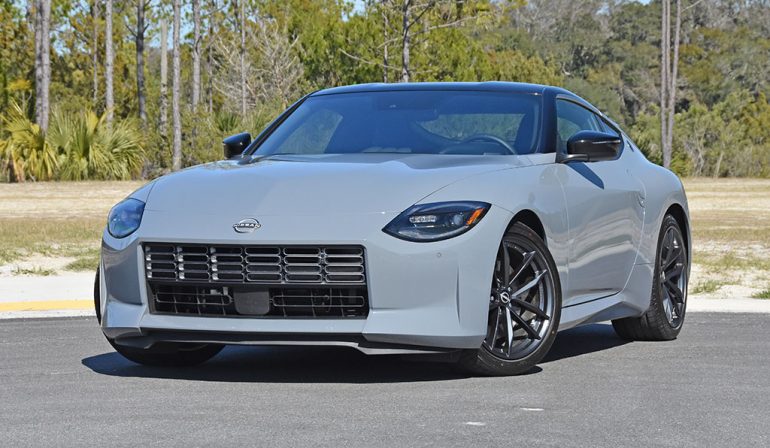
The Nissan Z is undoubtedly a legendary vehicle in the scheme of how it helped shape the sports car world when it made its way to our American shores in the early 1970s. Since then, the Nissan Z, known as the Datsun Z in its earlier days, has continued its path of being a somewhat affordable rear-wheel-drive sports car, with its latest iteration being the most powerful as it welcomes a new turbocharged powertrain that I’ve enjoyed in the Infiniti Q50 and Q60 Red Sport variations.
On the Nissan Z’s path to a redesign, Nissan took an interesting approach to what many enthusiasts will see as a refresh outside of it getting a new engine. Such a change brings us newer technology but retains many aspects of the outgoing 370 Z, which isn’t necessarily a bad thing, but it gets called out often by hardcore enthusiasts. With that, the new 2024 Z is not a compromise but a methodical approach to saving money on research and development (R&D) while they birth something that looks completely fresh out of the box, retaining many bits from the past. Such a smart approach by Nissan was clever. As I drove the new Z, I realized that it’s a serious head-turner with styling that harkens back to many generations ago of the Z yet retains some underpinnings from just a generation ago that continue to work for such a great platform from the onset.
Also, don’t forget that you can get discounted new car pricing with a free quote through qualified local dealer partners.
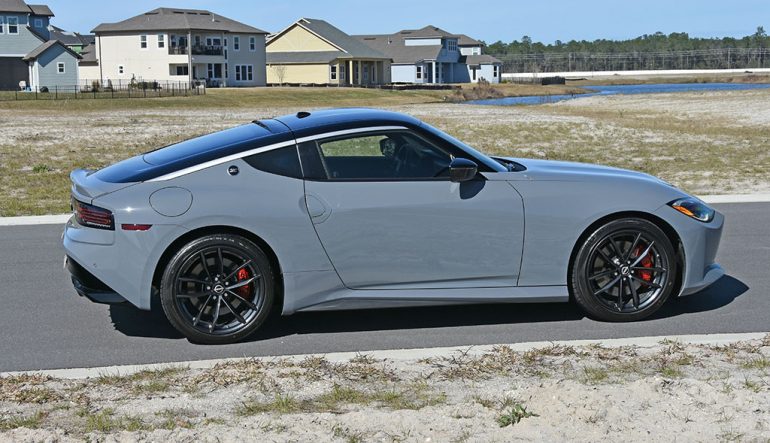
That retro styling, updated tech, and the sweet new engine choice will be what mostly carries the new Z through its newfound footing in a landscape where it competes with vehicles like the new Toyota GR Supra and Ford Mustang. For now, the Z seems to be such an elusive vehicle that heads will automatically turn when people see one, as sales haven’t exactly been stellar. However, after a week with the new Z equipped with a manual transmission, there’s plenty of hope for the Japanese sports car to find its new footing among the critical enthusiast crowd.
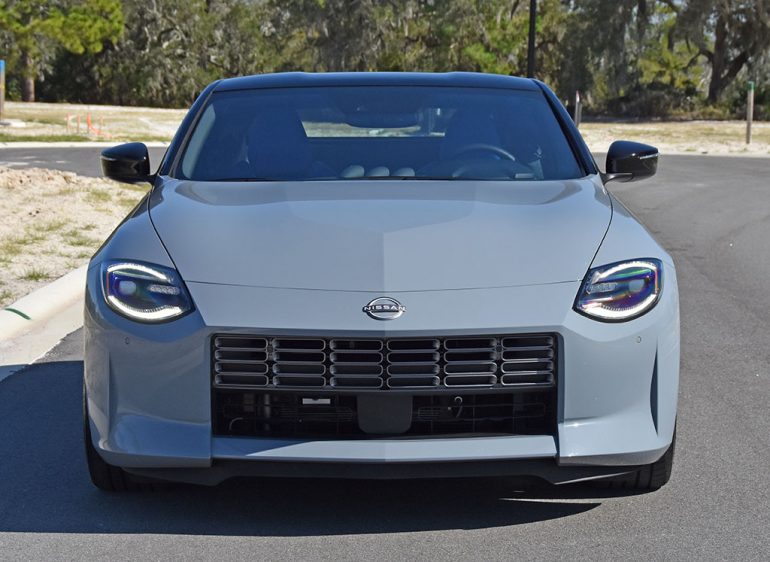
The new Nissan Z sports one of my favorite V6 engines, the 3.0-liter twin-turbo from the Infiniti Q50 Red Sport and Q60 Red Sport. Such an engine is deserving of an award as it has power all throughout its rev range hardly ever suffering from much turbo lag down low. It produces a healthy 400 horsepower at 6,400 rpm and 350 lb-ft of torque, maxing out from as low as 1,600 rpm. The interesting part of the power band is that the 400 horsepower carries mostly through 6,400 rpm on up to the 7,000 rpm redline, which nicely matches the longer gearing of the 6-speed manual transmission option. Yes, the new Z keeps things proper for enthusiasts with a no-additional-cost 6-speed manual variant. There’s even a mechanical limited-slip differential out back to help put down that twin-turbo power to the rear wheels, which could use some extra meat having 275/35R19 tires. A 9-speed automatic transmission is also available with no difference in cost, but as you may guess, such an option is not as attractive to purists.
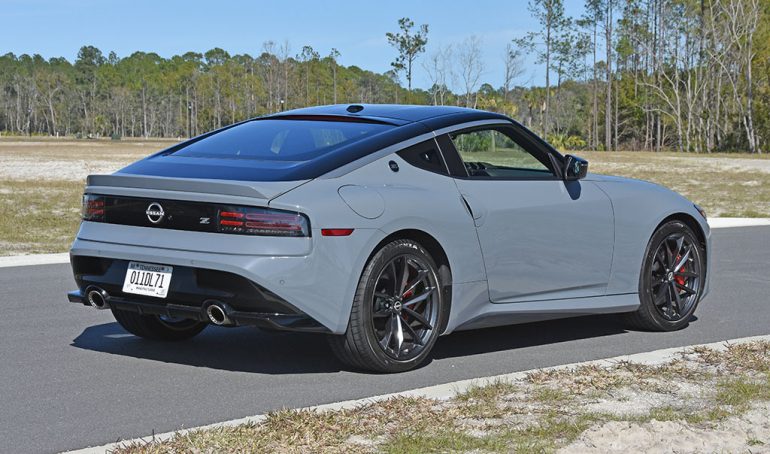
As far as driving dynamics go, the new Nissan Z feels a little more polished than the outgoing 370 Z but still retains some of those unique traits, such as the manual shifter having a rubbery feeling and transmits the engine vibration through the rev range. The SyncroRev Match system also makes a return permitting perfectly match downshifts without the need to master heel-toe shifting. The lurching effect of the body is still there upon aggressive acceleration, but I believe Nissan may have tamed things a bit, having the extra power from the new twin-turbo V6. Basically, the rear end squats down as the frontend lifts a bit more than most would expect, but it’s all part of the fun of such unique traits of a Nissan Z. The twin-turbo V6 is the only engine choice for the new Z, no matter the trim level, unless you opt for the automatic-transmission-only Z Nismo that has a slight bump in power to make 420 horsepower and 384 lb-ft of torque.
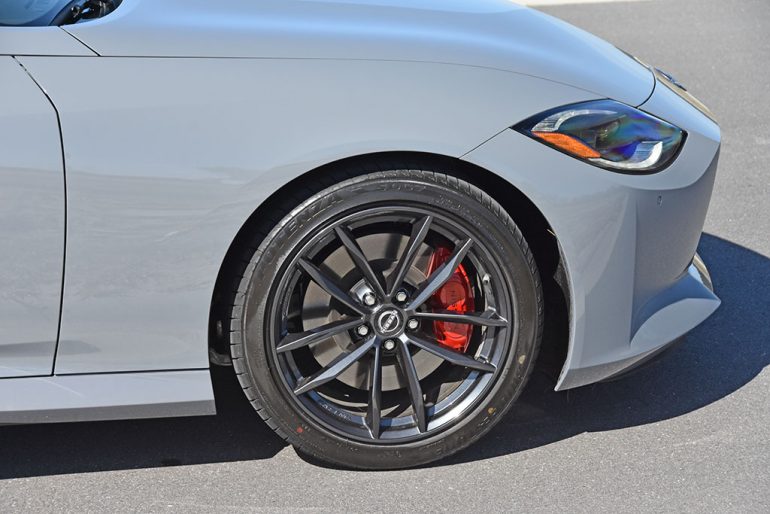
Much of what enthusiasts liked in the outgoing 370 Z seems to have found its way back into the new Z, which is part of the tell-tell of Nissan not going all out on R&D to create something completely different. The new Z still requires an extra bit of seat time to master its shifts and clutch engagement, just like in the older 370 Z. However, there’s something welcoming about the simplicity of the Z’s formula when you don’t have any drive modes to sift through nor any drive settings to change the dampers or steering effort. The new Z keeps things basic, and some will like it for being a vehicle you just jump in and drive it for what it is with no apologies for such an analog feeling. Even the pre-set rpm-limiting launch control is simple, where you clutch-in, put it in first gear, stomp on the throttle, and dump the clutch (or modulate it to slip it a bit to prevent things from bogging down). If you ever master a launch, you’ll see 60 mph from a stop in about 4.9 seconds.
Nissan’s simplistic approach with the new Z is something rare in today’s landscape of sports cars and most performance-oriented vehicles. Fundamentally, driving the new Z feels like all of what was old in the 350 Z and 370 Z is all new again, with added power bundled up in a stunningly good-looking retro package. From the Ray’s 19-inch forged alloy wheels on the Z Performance trims to the rev-happy twin-turbo V6 engine, the new Z is as close to analog as you will get in such a modern-day vehicle.
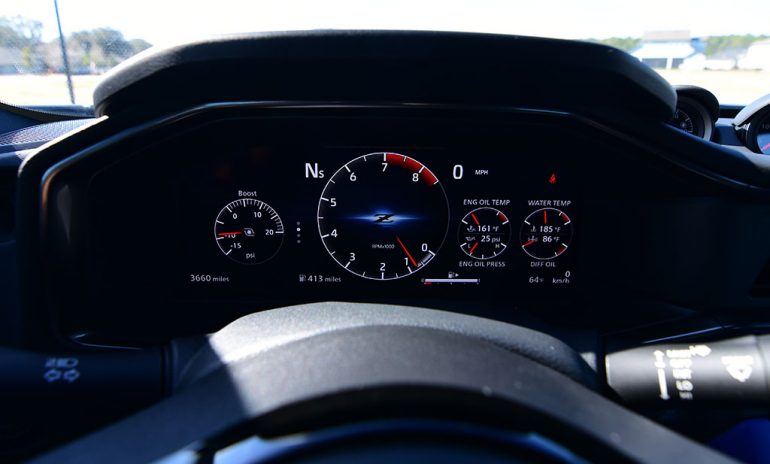
The new Nissan Z, having the twin-turbo V6, seems to do well with returning rather constant fuel consumption numbers. The EPA estimates of 18 mpg city, 24 mpg highway, and 20 mpg combined fall in line with real-world driving situations outside of continually driving aggressively.
For those who are familiar with the older 350 Z and outgoing 370 Z, you will quickly point out the areas that Nissan spent most time updating. Such areas are confined to the new 12.3-inch digital gauge cluster, 9-inch infotainment touchscreen (standard 8-inch or optional 9-inch on base trims), an updated steering wheel, updated seats with rather attractive color options, and revised 3-bay analog gauges that now show boost pressure, turbo speed, and voltage. Otherwise, there’s a rehash of many interior attributes in the Z, which can be a good thing, considering Nissan doesn’t try to fix what isn’t broken.
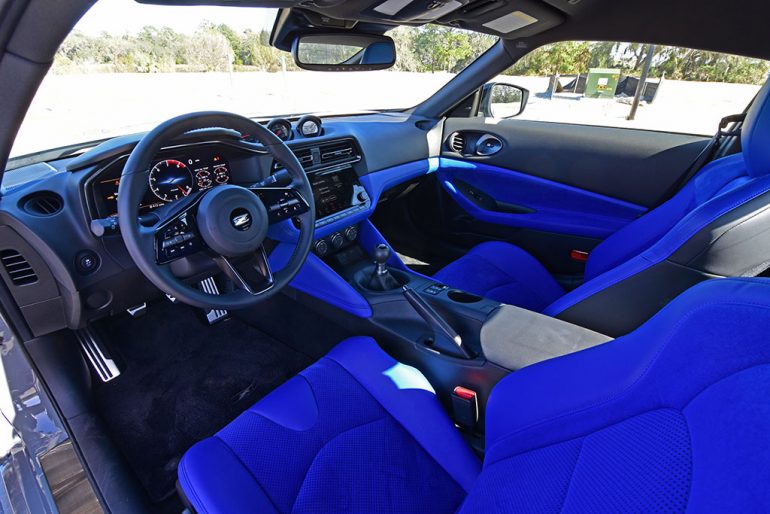
The seating areas are mostly what I remember in my many previous reviews of the 370 Z over the course of a decade. There’s just the right number of soft-touch surfaces and nicely done color accents, which include the delightful heated blue suede and leather seats of my Boulder Gray Pearl-painted test vehicle.
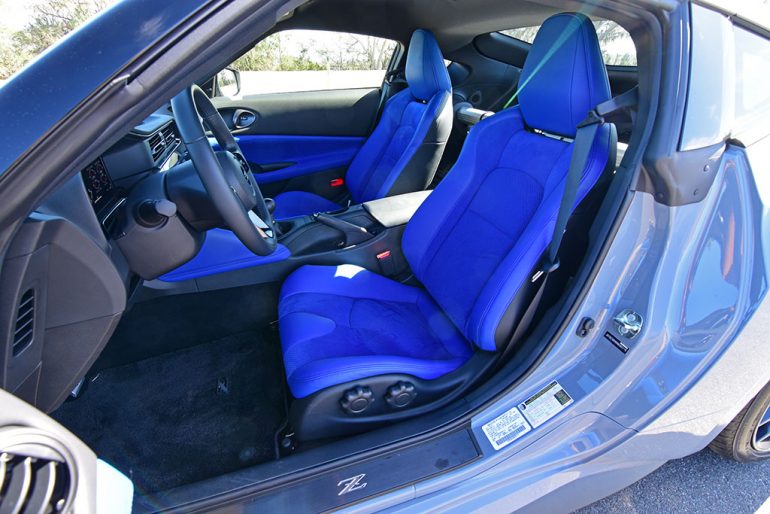
The controls are also mostly rehashed variations of the 370 Z featuring the three large automatic climate control dials. The other welcoming aspects to keep the Nissan Z up-to-date is the integration of wireless (and USB-connected) Apple CarPlay and Android Auto, which plays nicely with the 9-inch infotainment touchscreen system.
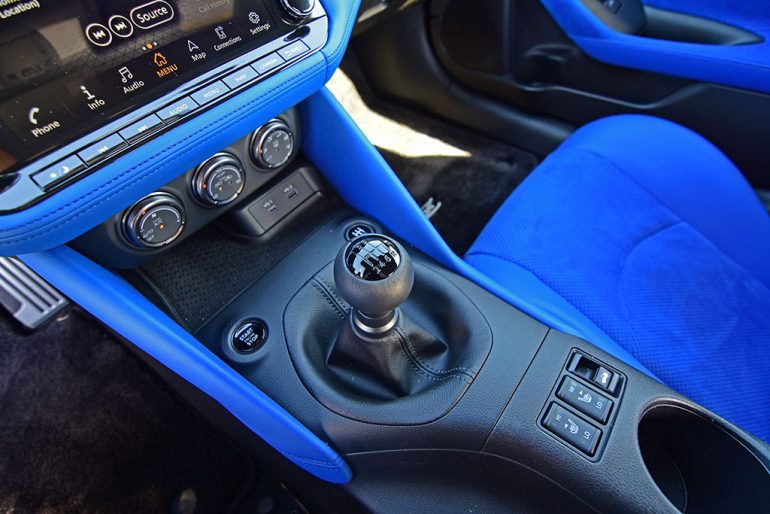
Nissan includes a bevy of active safety features in the new Nissan Z, such as having blind spot monitors with rear cross-traffic warning, lane departure warning, front/rear parking sensors, forward collision warning with automatic emergency braking, and adaptive cruise control. The backup camera is single-angle but has active predictive backup lines.
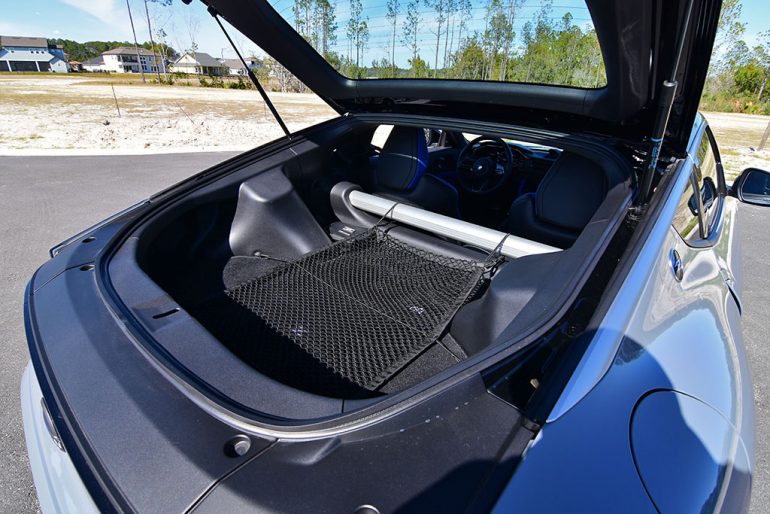
There are a lot of ‘other’ things Nissan could have done to the Z, but let’s be real, it would cost well over its starting price of just $42,310 and even more above my Z Performance test vehicle with the manual transmission coming in at $55,110. It may not be the quickest vehicle in its class, but it sure remains one that stands out in a crowd and has a platform that enthusiasts can build off – all with an available manual transmission. The days of the Z live on, and hopefully, it will catch on for a broader spectrum of enthusiasts, sooner rather than later.